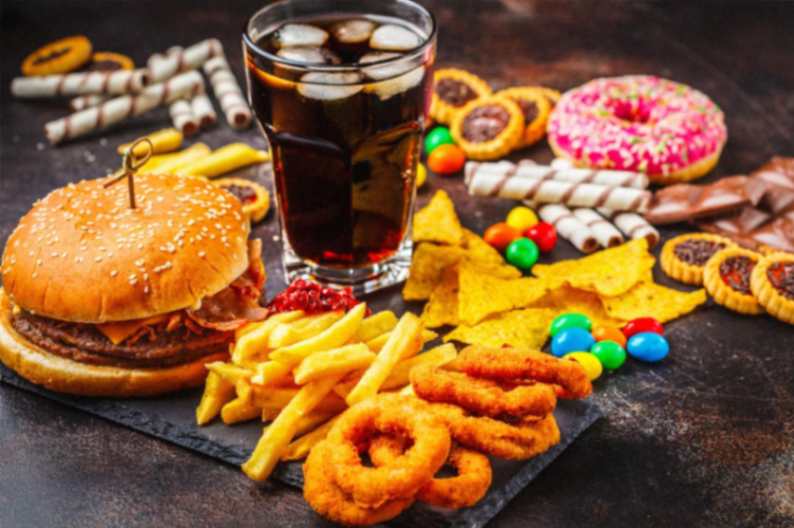When you consider how highly advanced our brains truly are, it seems counterintuitive that we would knowingly consume food and drink that’s loaded with toxins detrimental to our health.
Article at a Glance:
Junk Food & the Brain
- Junk food satisfies our brain’s reward system by causing a release of dopamine
- Unfortunately junk food just leaves us wanting more junk food
- This junk food cycle can be highly toxic to our health
Junk Food & the Body
- Junk food is high in sugar and high-fructose corn syrup
- Junk food is loaded with chemicals
- Junk food lacks nutrients and fiber
- Empty calories have been linked to high triglycerides and cholesterol, which can lead to heart disease and more
Oxidative Stress & Free Radicals
- Oxidative stress occurs when there is an imbalance between antioxidants and free radicals
- Oxidative damage from free radicals has been linked to many age-related conditions
- Junk and processed foods contribute to body-harming free radicals
Fruits & Veggies to the Rescue
- The CDC says most people don’t get all the fruits and veggies they need every day
- Fruits and veggies are loaded with important vitamins, minerals and antioxidants
- Fruits and veggies are also packed with different forms of fiber
The human mind is powerful enough to decipher complex mathematical equations, problem-solve its way through numerous sticky philosophical conundrums, and manipulate complicated machinery—yet somehow, it foolishly falls prey to the pleasurable trappings of fried chicken and donuts on a regular basis.
While cravings for junk food are often falsely attributed to simple hunger or a lack of willpower on our part, the real culprit is our brain’s near-constant need for satisfaction through a reward system. In neuroscience, a reward system is a collection of brain structures and neural pathways responsible for reward-related cognition such as associative learning and incentive salience, or the wanting, desiring, and craving we feel for numerous vices. In short, our brains like to feel good and when we give it something that does just that, it covets more of that sensation.
This is largely due to a release of dopamine that is triggered in our brains when we consume our hedonistic, high-calorie rewards. Despite the negative consequences paid by the rest of our body, the more junk food we eat, the more our brains crave the rush of dopamine.
What Does Junk Food Do To The Body?
One of the main problems with junk food is that the reward it gives our brains is far more powerful than the rewards our brains get from healthy, whole foods. You can eat a carrot or a grilled skinless chicken breast and the dopamine dose you’ll receive pales in comparison to the massive amount released in your brain when you consume a pint of rocky road ice cream. And this concern is demonstrated in animal studies, which show that junk food can be just as physically addictive as abusive drugs.
But while our brains are reaping those chemical rewards, our bodies are begging for mercy. The general composition of junk food includes a veritable all-star team of unhealthy characteristics. It’s usually full of sugar and high-fructose corn syrup, which are empty calories that have been linked with high triglycerides, cholesterol, and fat buildup in the liver. These can all lead to heart disease, diabetes, and obesity.
In fact, in a review of junk food and the human heart, researchers revealed that eating fast food more than once per week is tied to a higher risk for obesity, while eating it more than twice per week increases the risk of some rather dangerous conditions.
Then there’s the chemical ingredients that fill most junk food, including preservatives, colorants, flavorants, and texturants. These chemicals work to make even the lowest-grade food not only palatable, but full-on craveable. Junk food is also often high in refined carbohydrates (carbs with the nutrients and fiber removed) that lead to rapid blood sugar spikes. And when your blood sugar returns to normal, the carbohydrate craving begins all over again. There’s also the trans fats present in junk food produced by the refined vegetable and seed oils used for cooking. These undesirable fats raise your bad cholesterol (LDL) levels while lowering your good cholesterol levels (HDL), increasing the risk of heart disease and stroke.
And finally, junk food is low in nutrients and fiber. Processed foods lack the vitamins, minerals, and antioxidants our bodies need to fight the oxidative stress caused by rogue free radical molecules (which are caused by the junk food to begin with). Plus, a diet low in fiber can lead to a bevy of gastrointestinal conditions and more.
The Negative Effects Of Oxidative Stress & Free Radicals
Oxidative stress constitutes an imbalance between the free radicals and antioxidants roaming your body. Those free radicals are molecules that contain oxygen, along with an uneven number of electrons—it is this odd number that allows the molecules to stage either healthy or unhealthy reactions (or oxidation) with other molecules.
When all systems are running smoothly, oxidation is a normal bodily process. But a molecular imbalance between free radicals and antioxidants can do heaps of damage to your fatty tissue, proteins, and even your DNA when your antioxidant levels are low. Indeed, oxidative damage caused by free radicals accumulates during your natural life cycle, and has been implicated in unhealthy aging and cardiovascular disease, neurodegenerative disorders, and other chronic conditions.
Overeating certain foods can actually increase free radical production by inspiring our mitochondria to release more activated oxygen during energy consumption. Foods more likely to generate free radicals include anything rich in refined carbohydrates and sugars, like most junk food, as well as foods loaded with preservatives, like processed meats including bacon and sausage. Red meat increases free radicals, because its high-iron content leaves it vulnerable to oxidation, while alcohol is also known to make free radicals more prevalent.
To counter oxidative stress caused by free radicals, your diet should be front-loaded with foods rich in antioxidants, which are found in a wide variety of plants that boast the likes of selenium, phytonutrients, polyphenols, and vitamins A, C, and E.
Harvesting The Antioxidant Bounty of Fruits & Vegetables
Much of the interest surrounding fruits and vegetables is focused on the vital role of antioxidants, which not only impart bright colors, but also act as healthy scavengers in the body, cleaning up free radicals and fighting back against the negative effects they have on the body’s cells and tissues. Some of the antioxidants found in fruits and veggies that are among the most highly touted by researchers include phenolic flavonoids, lycopene, carotenoids, glucosinolates, resveratrol, lutein and zeaxanthin. These antioxidants possess varying benefits to the body, including anti-inflammatory properties that are known to battle against a host of ailments that affect the heart, joints, brain and more.
One part of the vital elements of overall wellness—heart health—benefits greatly from the antioxidant power of fruits and vegetables. Researchers have reported that fruits containing a high amount of anthocyanins, flavonols, and procyanidins—like berries, grapes, and pomegranate—are potentially effective at decreasing cardiovascular risk, while citrus fruits and apples have a positive impact on blood pressure and blood lipid levels.
Meanwhile, it’s also reported that an increased consumption of carotenoid-rich fruits and vegetables helps maintain healthy cholesterol levels in blood since they reduce free radical damage and help the body resist LDL (bad cholesterol) oxidation.
"There is incontrovertible but boring evidence that eating your fruits and vegetables is probably the best thing you can do for preventing cancer, for weight control, for diabetes, for all the different Western diseases that now afflict us."
Fruits & Veggies: Working 5 to 9 Servings Into Your Diet
It’s hard to believe that some people don’t like fruits and vegetables despite their delicious taste and myriad of textures. And tragically, there are people who don’t have easy access to nature’s bounty. According to a report by the Centers for Disease Control and Prevention (CDC), only one in 10 adults in the U.S. meet the federal fruit and vegetable eating recommendations, whether by choice or circumstance.
And that really is a shame. Not only are these foods numerous in variety and versatile in how they can be prepared and eaten, but the health benefits absorbed from a steady diet of organic fruits and veggies is rather amazing.
"Eat food. Not too much. Mostly plants,” says Michael Pollan in his book, In Defense of Food. The author, journalist, and professor at Harvard University has written a handful of books concerning the sometimes contentious relationship that Americans have with food. Pollan also points out that most of the non-fruit and veggie products we purchase at supermarkets, fast food joints, and restaurants aren’t really good at all.
In an interview with NPR, Pollan states that "There is incontrovertible but boring evidence that eating your fruits and vegetables is probably the best thing you can do for preventing cancer, for weight control, for diabetes, for all the different Western diseases that now afflict us."
The Benefits Of Organic Food & Organic Juicing
As you roam through your local supermarket, you’re likely to wander by the organic section—and in that moment you’ll probably contemplate whether or not the produce in that section is worth the elevated price tag.
Well, according to a vast treasure trove of scientific research, it very well might be worth shelling out a few extra bucks for fruits and vegetables certified as organic. A meta-analyses on 343 peer-reviewed publications reports important differences between organic and non-organic fruits and vegetables. The review states that not only are antioxidant levels higher in organic foods, but there is also significantly less pesticide residue found inside of them and on their surfaces.
As for the popular pastime of juicing your fruits and vegetables, anytime you can squeeze more plant-based antioxidants into your body, that’s a good thing. With the CDC’s report regarding the pathetically low numbers of the population that actually get the full recommended servings of fruits and vegetables every day, it seems that we need all the help we can get.
The American Heart Association recommends 25 grams of fiber per day based on a 2,000-calorie daily diet
Finding Fiber In The Produce Section
Everyone has heard the term “roughage” and that you should eat it to help you digest your meal. But does anyone know what roughage really is? Roughage is dietary fiber, a plant-derived food that our digestive enzymes cannot entirely break down—but in this case, undigested food is a good thing. There are two types of fiber: soluble and insoluble. Soluble fiber can be dissolved in water; it is found in citrus fruits, apples, carrots, and other tasty natural plant foods. Insoluble fiber, on the other hand, cannot be dissolved and thus promotes healthy movement through the bowels.
One of the greatest byproducts of fiber is that it can help your body absorb more of the nutrients found in the food you eat. Research shows that the fiber in fruits and vegetables reduce the speed in which food passes through your intestines, enabling more gradual nutrient absorption and preventing constipation. More research shows that fiber can be fermented in the colon, increasing the concentration of short chain fatty acids that can maintain gut health while having anticarcinogenic properties.
One soluble fiber of keen interest and study is psyllium, which is sourced from the husks of the Plantago ovata seed. Researchers say that psyllium retains its water-holding capacity throughout the large intestine and provides a normalizing effect on bowel movements—easing both constipation and diarrhea.
The American Heart Association recommends 25 grams of fiber per day based on a 2,000-calorie daily diet. However, reflecting the growing emphasis by health experts on the importance of dietary fiber, the recommended daily intake of fiber on food and supplement labels was recently increased to 28 grams, showing the belief that the rewards of fiber can be profound.
Whole Foods Promote A Healthy, Unprocessed Life
As the saying goes, “you are what you eat.” Wouldn’t you rather embody an all-natural collection of fruits and vegetables that promote energy and vitality than a conglomeration of mutated and processed food-like products that leave you feeling like a lethargic mess? When you think about it, it’s easy to choose Earth’s natural bounty over man-made junk.









